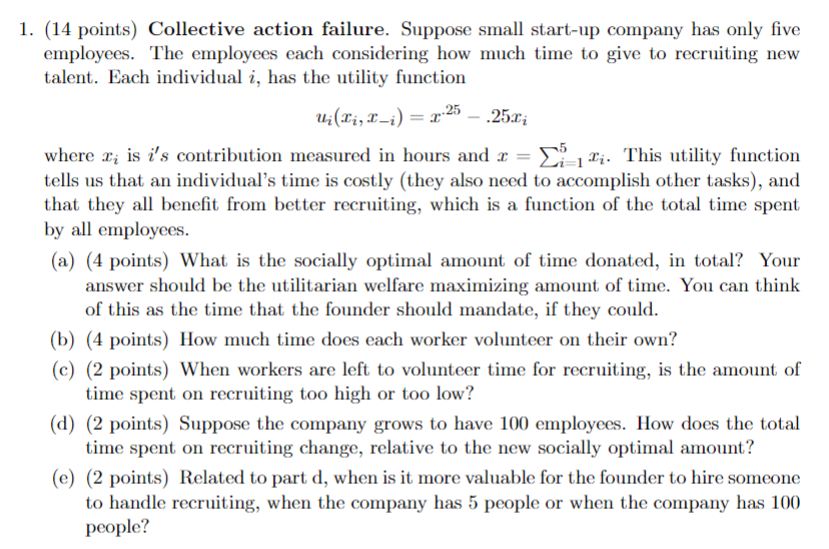
1. (14 points) Collective action failure. Suppose small start-up company has only five employees. The employees each considering how much time to give to recruiting new talent. Each individual i, has the utility function ui(xi,xi)=x.25.25xi where xi is is contribution measured in hours and x=i=15xi. This utility function tells us that an individual's time is costly (they also need to accomplish other tasks), and that they all benefit from better recruiting, which is a function of the total time spent by all employees. (a) (4 points) What is the socially optimal amount of time donated, in total? Your answer should be the utilitarian welfare maximizing amount of time. You can think of this as the time that the founder should mandate, if they could. (b) (4 points) How much time does each worker volunteer on their own? (c) (2 points) When workers are left to volunteer time for recruiting, is the amount of time spent on recruiting too high or too low? (d) (2 points) Suppose the company grows to have 100 employees. How does the total time spent on recruiting change, relative to the new socially optimal amount? (e) (2 points) Related to part d, when is it more valuable for the founder to hire someone to handle recruiting, when the company has 5 people or when the company has 100 people? 1. (14 points) Collective action failure. Suppose small start-up company has only five employees. The employees each considering how much time to give to recruiting new talent. Each individual i, has the utility function ui(xi,xi)=x.25.25xi where xi is is contribution measured in hours and x=i=15xi. This utility function tells us that an individual's time is costly (they also need to accomplish other tasks), and that they all benefit from better recruiting, which is a function of the total time spent by all employees. (a) (4 points) What is the socially optimal amount of time donated, in total? Your answer should be the utilitarian welfare maximizing amount of time. You can think of this as the time that the founder should mandate, if they could. (b) (4 points) How much time does each worker volunteer on their own? (c) (2 points) When workers are left to volunteer time for recruiting, is the amount of time spent on recruiting too high or too low? (d) (2 points) Suppose the company grows to have 100 employees. How does the total time spent on recruiting change, relative to the new socially optimal amount? (e) (2 points) Related to part d, when is it more valuable for the founder to hire someone to handle recruiting, when the company has 5 people or when the company has 100 people







